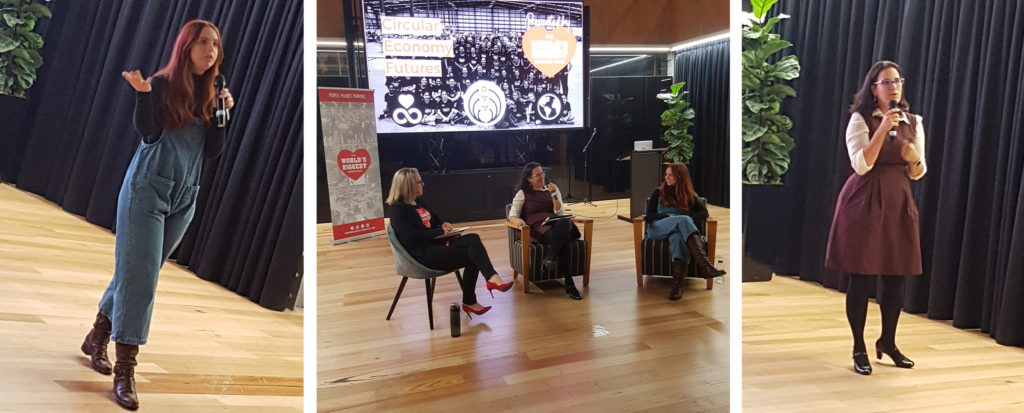Waste is now visible in our lives. Throwing away our unwanted stuff is an act of power. We move it to the edge of the kitchen, then to the edge of the curb where it is taken to landfill on the edge of the city or to the ocean on the edge of the land. Recycling and upcycling are only shuffling the problem.
The waste solution lies in relearning skills we have forgotten like reusing, cooking, sewing, composting and creating for ourselves. Making everyday choices for health and wellbeing.
These insights are from a recent Circular Economy Futures meetup where speakers Jacq Driscoll from Biome and Dr Manuela Taboada from QUT’s Institute for Future Environments discussed waste solutions in our crazy convenient throwaway society.
Jacq Driscoll said our sole purpose is to create, not to consume. We are creative beings and can make things. When we buy less, we create more time to make our own products. Her refreshing words offer the simplest solutions to the waste crisis. The solution is you, and what you can do every single day through individual action.
Waste issues have blown up in past two years as we’ve begun to understand the extent of the problems created by convenience culture after China stopped taking our contaminated discarded plastic for recycling.
Stopping waste is now a movement, sparked in part by the ABC’s War on Waste program which highlighted the problems in various sectors. Clearly we need to respect our resources and no longer attempt to make our waste someone else’s responsibility.
This requires individual behaviour change and an introduction to zero waste living. Jacq cited Bea Johnson, author of Zero Waste Home, who puts recycling near the bottom of the list of actions: Refuse, Reduce, Reuse, Recycle and Rot. The first three Rs are most important, because a lot of waste we are creating can’t be recycled or won’t rot.
Refuse to buy stuff. Stop the cycle of consuming, give yourself permission to say no. We don’t actually need anything to have a reusable life, we have all we need already. Connect with each other more, communicate what we want and choose experiences over things. Purposefully declutter, reuse, repair, re-gift, and share what already exists. Think twice before buying plastic products. Preference products that can rot and return back to earth from whence they came.
Jacq said everyday skills like sewing, cooking and gardening are important for reducing waste. We need to compost as much as we can because organic matter in landfill produces methane. Community gardens can compost food scraps if you don’t have your own system.
A complementary message came from QUT’s Dr Manuela Taboada who is researching ways to design out plastic by understanding individual behaviour in relation to plastic consumption and disposal. She does not believe in recycling and says waste prevention is more important.
About 8,300,000,000 tonnes of plastic have been produced since the 1950s and about 80 per cent of this is still hanging about on Earth.
Manuela said we need top down, bottom up and middle out approaches to change create, where imperfect action is better than none.
Overwhelm, denial and scepticism can stop action therefore we need to make it feel manageable, relatable, identifiable and visible. Bringing it back to our own health and wellbeing enables us to appreciate how our efforts contribute to change.
Through the QUT Institute for Future Environments, Manuela has designed a plastic-count app, known as ZIP, to help us understand where plastic exists in our lives and how much we throw away every day. It is a platform of accountability, raising awareness and providing data on individual plastic disposal and usage patterns.
We need to stop consuming, even though nobody wants to hear that. We also need to make products that can be disassembled and get away from the crazy convenience of throwaway. It is all about education and connecting more with others to become everyday activists.
This meetup session was music to my ears, having stepped away from consumption to advocate for an upcycled lifestyle in 2013 when I set up Textile Beat to explore slow clothing as the antidote to fast fashion. And FYI, two-thirds of clothing is made from plastic fibres in case you didn’t know.
